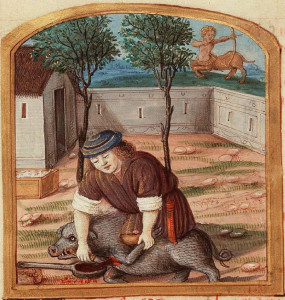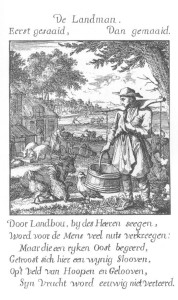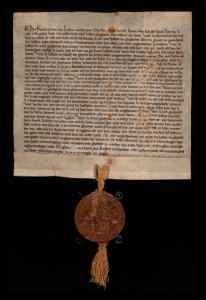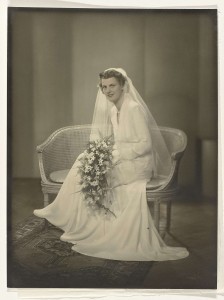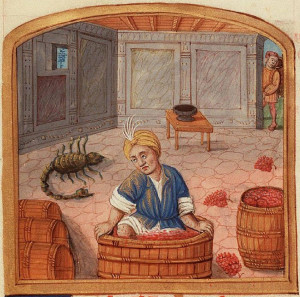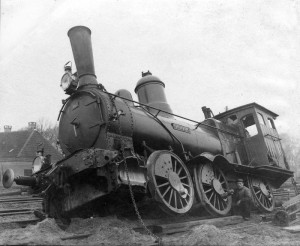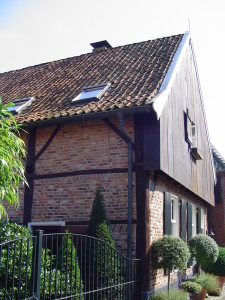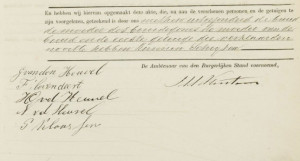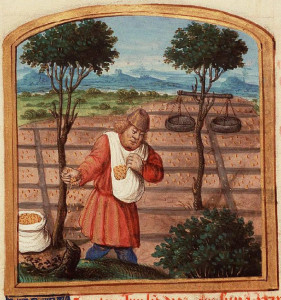Slachtmaand literally means "slaughter month" and is the old word for November. … [Read more...]
Dutch term – Landbouwer
A landbouwer is a farmer. There are several related terms that you may encounter in the records: Boer (farmer) Boerenknecht (farm hand) Landgebruiker (literally: land user, often a tenant farmer) Landman (farmer) Bouwman (farmer) Akkerbouwer (field farmer) Veehouder (cattle holder) Varkenshouder (pig holder) Graanboer (grain farmer) Most farmers did not own the farms they worked on. Many were tenants. Originally, their rent would have been a percentage of the yield, … [Read more...]
Dutch term – Waterschap
The Waterschap is the water board, the government agency responsible for water management. With half our country below sea level, that is a big responsibility. Just last night, the water boards decided to close the storm surge barriers between the North Sea and the rivers to prevent major flooding. Water boards have been around for a very long time. The Hoogheemraadschap Rijnland water board for example, was invested by count Floris V of Holland in 1286. That water board exists to this day … [Read more...]
Dutch term – Trouwen met de handschoen
Trouwen met de handschoen literally means "marrying with the glove" and means a proxy marriage. People marry "with the glove" if they can't be in the same location during the marriage ceremony. The bride or the groom is represented by someone with a power of attorney and the marriage will take place as usual, probably with the exception of the kissing of the bride! Originally, a glove was displayed to signify the absent party, which is how the procedure got its informal name. The formal name … [Read more...]
Dutch term – Wijnmaand
Wijnmaand literally means "wine month" and is the old word for October. … [Read more...]
Dutch term: Spoorwegen
The term Spoorwegen means Railways. The first railway in the Netherlands began in 1839, and ran between Amsterdam and Haarlem. In the rest of the 19th century, a multitude of railway companies developed a railway network that spanned the entire country. The train quickly replaced the Trekschuit (pulled barge) as the most popular form of long-distance transportation. … [Read more...]
Dutch term – Timmerman
A timmerman is a carpenter. In the days before all houses were made of concrete or brick, carpenters built the frames. In the Middle Ages, most houses were made of wood. The houses had timber frames filled up with wicker and mud/clay. Later, bricks were used to fill in the timbers. Many carpenters were also employed to build ships. In the 17th century, the Russian Czar Peter the Great came to Zaandam to be apprenticed as a shipwright. … [Read more...]
Dutch term – Schrijven
Schrijven means 'to write.' It wasn't until well into the 20th century that most of the people in the Netherlands were able to write. In birth, marriage or death records in the 19th century, you will often read sentences like "verklarende de moeder der bruid uit hoofde van ongeleerdheid niet te kunnen schrijven" [declared the mother of the bride, for reasons of not being educated, to be unable to write]. Women were more likely to be illiterate than men. It is worth checking the bottoms of … [Read more...]
Dutch term – Herberg
A herberg was an inn. Herbergen played an important role in the community. It was where people came after work or after church, where they stayed if they were travelling and where they met business partners to discuss deals. Innkeepers often played a role as informal scribes, writing documents for clients who could not read or write. Things could get rowdy. When things got so rough that someone got injured or killed, so you can find inns featured in court records. If your ancestor was an … [Read more...]
Dutch term – Herfstmaand
Herfstmaand (literally: Autumn month) is the old word for September. … [Read more...]
